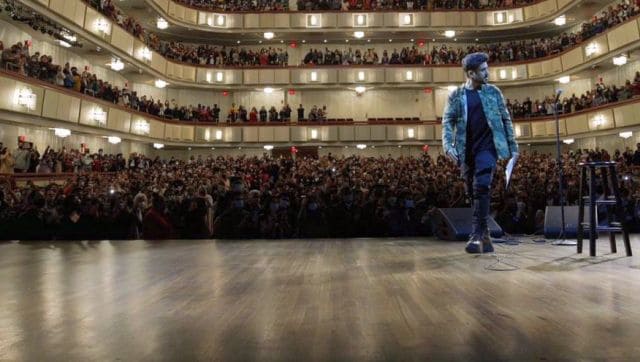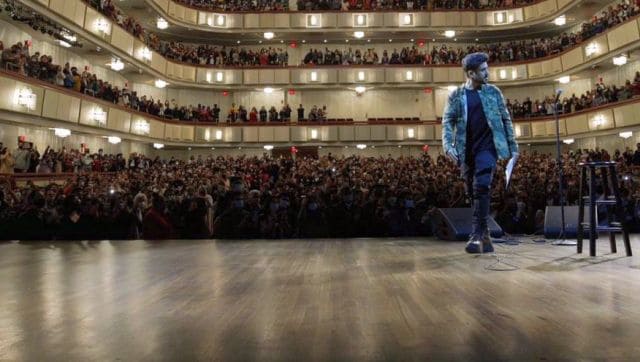Piggy Chops changed her accent. She also lowered the bar for the kind of work she was doing there. Das has stuck to his accent and not tailored his jokes for a foreign audience

Vir Das at the Kennedy Centre where he performed for the ‘I come from two Indias’ show. Image Courtesy: Vir Das/Instagram
What a columnfest this has been. Vir Das’ six-minute Two Indias ‘poem’ has been written about more than any fragment of pop culture in recent times. It’s become a catchphrase, like ‘Chak De India’. Whether we agree or disagree, it’s seeped into the nation’s conscious and subconscious headspace. When former Lok Sabha speaker Meira Kumar says that there are two kinds of Hindus in the country, those who can enter temples and those who cannot, the statement has shades of what Vir said.
While I’ve always insisted that bad writing should be made a non-bailable offence, I’ll make an exception here. A minister has banned Das from performing in Madhya Pradesh; police complaints have been filed elsewhere. This means Vir can perform in Kennedy Centre but not in Bharat Bhawan. Considering an average Vir Das world tour spans more than 20 countries in six continents, a fat amount of difference will make it to him. It’s still a pity though given that Bharat Bhawan is such a nice open-air venue. I remember tagging along with my parents for poetry festivals there and watching plays in the amphitheatre against the backdrop of the lake.
‘Defaming the country’ is a flimsy subjective pretext to file a complaint against someone. Twitterati, columnists, rappers, filmmakers, writers, all critique India and have a right to do so as citizens and creative people. We live in the time of a million memes, which send up someone or the other every single minute on social media. In many ways, we live in less hypersensitive times. But it’s also true that in the North Pole/ South Pole landscape of Twitter, outrage is daily fodder. Once outrage is monetised, it’s easy to manipulate.
I don’t think Das set out to create controversy. I don’t think he had any idea that it would become as big as it did. He’s done far better work. There was no mimicry in the poem he read, one of his strengths. There is a sketch where he invents a religion called Chrislaam. It features a side-splitting moment where he mimics singing Hallelujah as it segues into the muezzin’s call to prayer. Now, that was really funny and ‘offensive’, like all comedy should be.
I felt that most outrage stemmed from that old Indian affliction: Jealousy. The outrage of self-styled patriots who use the word ‘anti-national’ as a default word for everything they disagree with is predictable. I was more fascinated by the liberals who dissed Vir. The hyper-Westernised Indian liberal, generally speaking, does not like anything that is homegrown (more on this in a bit). Everything that is good in art and culture happens in the West. Indians playing with foreign art forms, like stand-up comedy, are seen as pale copies. Indians can never match up. Watch Norm Macdonald.
What irritated both sides was the applause Vir got at the end of the show. Out of that jealousy came the backlash. There is a moment when he leaves the stage and returns, the auditorium still thundering. While Vir insisted the clapping was for India, the Great Country, he had also, deploying the guile of a good performer, redirected the applause to himself.
Comedy is a business, like politics. Eventually one is selling a product, even though the politician will couch his marketing spiel in lofty and noble terms. As a social commentator, the comedian’s material is intertwined with the political scenario. If the politics is polarised, the comedian’s audience also arrives pre-polarised. The comedian has to choose her constituency and speak to it. A fundamental choice has to be made and Vir has made that choice, much like all American late-night talk show hosts. What is lacking on the Right, whether in India or America, is its own vibrant stand-up culture.
What distinguishes American comedy is that it has no holy cows. To take just one example, watch this clip on YouTube where Jimmy Kimmel is interviewing Stormy Daniels. Stormy has written a memoir where, among other things, she writes in detail about an intimate encounter with America’s Commander-in-Chief, including spanking him, on his request, with a rolled-up magazine. The clip ends with Kimmel displaying a tray with models of the male organ (clay or rubber I couldn’t tell) in different sizes. Stormy has to choose the one that comes closest. This kind of humour is unimaginable in India. It does show though how harmless humour is. The American state is alive and kicking despite this ‘assault’ on the President’s privacy.
Vir belongs to my generation: We are both in our 40s. What makes him special is that he is completely homegrown. In the noughties, I remember watching him at 7 pm on a channel called Zoom. We had hardly seen any stand-up before we saw him. Vir would deliver gags about issues of national importance like weird punishments in Doon School. He was putting his act together. He had acting ambitions as well, featuring in a film called Mumbai Salsa. It’s been quite the journey since then; Das has appeared as a guest and performed his sketches on every single American late-night show, no mean achievement given how insular America is. He has a bunch of Netflix specials to his name, which has given him a global audience.
His journey to the West has been more authentic than Priyanka Chopra’s. Piggy Chops changed her accent. She also lowered the bar for the kind of work she was doing there. Baywatch is not Vishal Bhardwaj’s Kaminey. Das has stuck to his accent and not tailored his jokes for a foreign audience. He’s just kept doing what he was doing and managed to take it to the world. To that extent, the bi-lingual urban Indian feels a kinship with him. He’s not an NRI comedian whose jokes are palpably different, often speaking to the foreign audience’s stereotypes of India, from chaos and colour to arranged marriages and the Indian accent. Vir does not do the Indian accent joke because he speaks in an Indian accent and does not find it funny. To that extent, Das reverses what NRI comedians do. He gives us on our own terms. He uses the f-word like we do in Hinglish speech.
As for the art of stand-up comedy, I personally prefer reading humour far more than seeing it acted out on stage. It’s too taxing to watch a Netflix special — one man going on and on for an hour and a half. If one is in the audience, there is the curious pressure of other people laughing. The collective forces one to shake uncontrollably, giggle and guffaw for the cameras. The laughter has to be externalised and visible.
There are these warnings on the back cover of ‘funny books’: ‘This will make you laugh out loud’; ‘Don’t read this on the subway. Your laughter might disturb fellow passengers.’ The truth is that this rarely happens. Reading is a private act. Instead of baring a grin, one chuckles quietly or laughs silently, the best medicine for the soul.
The writer is the author of ‘The Butterfly Generation’ and the editor of ‘House Spirit: Drinking in India’. Views expressed are personal.







More News
A Guide to Enhanced Security in Bare Metal Hosting
5,000 tonne of onions to be irradiated to ensure higher availability of onions | India News – Times of India
Himachal Pradesh Assembly By-Elections: Congress Announces Candidates For 3 Seats